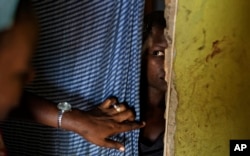The first national survey in Uganda on child abuse reveals that violence against children - ranging from physical, sexual and emotional - is occurring at all levels in society.
Mary Komugisha, 40, a single mother and food vendor in Kiswa, a Kampala suburb, became a grandmother under terrible circumstances.
Her 11-year-old daughter was raped.
She says her child was in 7th grade when she told her she had a problem. I am the mother and the father, Komugisha says, but I stayed strong. She told me so-and-so raped her in the toilet. He told her not to tell anyone or else I would beat her. She gave birth but; our situation is so bad. I don’t even have money to put her back in school, she says.
Komugisha lives in a one-room, iron-sheet shelter with her three children and granddaughter.
Her daughter is one of 25 percent of Ugandan females who experienced sexual violence below the age of 13. That’s according to a United Nations Children’s Fund (UNICEF) report released Thursday – the first for Uganda on child abuse.
And it doesn’t get any better for teenagers.
UNICEF says 35 percent of Ugandan females and 17 percent of males have been sexually abused.
UNICEF Deputy Country Representative Noreen Prendville describes the findings as absolutely shocking.
“While we did see of course that there were also young men and boys that were victims of sexual violence, of course the consequence for girls are even worse. We have a problem in the country as well with quite a big challenge on early marriage and early childbearing. And that sometimes is a cultural issue, but also sometimes related to poverty,” said Prendville.
Physical, sexual and emotional violence against children, according to the report, is experienced on the street, at home and even in school – as happened with Komugisha’s daughter.
Even though some children who suffered violence knew where to seek help, many, especially girls, were too embarrassed for themselves and their families to ask for it.
Dr. Jesca Nsungwa is Commissioner for Child Health at Uganda’s Ministry of Health. She says the government is taking steps to address the abuse.
“To increase access and availability of quality child and adolescent health services at all health facilities that provide prompt, affordable and appropriate prevention and response services to survivors of violence without discrimination. We also commit to train health care workers on provision of child and adolescent friendly health services within our national framework,” said Nsungwa.
Children who experience violence, says the U.N. report, are more likely to become perpetrators of violence against children themselves if they don’t get help.
The Uganda report follows a call in 2006 by then-U.N. secretary general Kofi Annan for all nations to tackle child abuse by collecting data to inform policies.
To date, only 15 countries have released reports on the frequency of child abuse. In Africa, they include Kenya, Malawi, Swaziland, Tanzania, Zimbabwe, and now Uganda.





